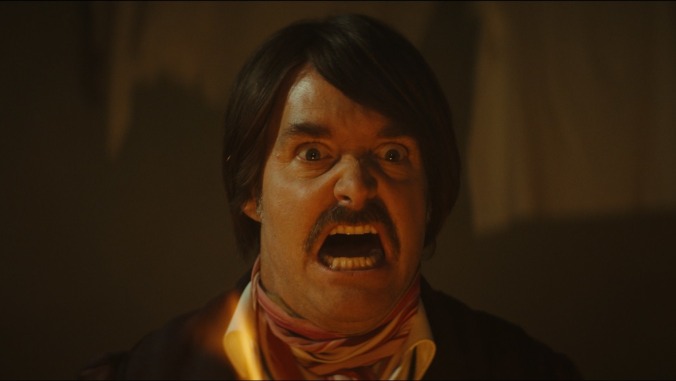Extra Ordinary is a warm, low-key trip to Ghostbusters territory


The supernatural comedy Extra Ordinary opens with, and periodically returns to, lo-fi VHS footage, expertly faked complete with tracking noise at the bottom of the frame. These bits are excerpts from a video series called Investigating The Extraordinary, where host Vincent Dooley (Risteárd Cooper) explains how we’re surrounded by ghosts that are easy to miss without a keen second sight, in a tone just serious enough for the goofiest lines to sneak up and score a laugh. (“Even the weakest ghost can possess cheese quite easily,” he explains matter-of-factly). Given these kitschy interludes and the movie’s synth-y score, it seems possible early on that Extra Ordinary will be aimed directly at those ’80s fetishists who treat Ghostbusters as scripture—and that the movie will toil away in a subgenre that claims Ghostbusters as one of its few successes.
Blessedly, Rose Dooley (Maeve Higgins), the film’s hero, hasn’t even heard of Ghostbusters, which the audience learns from a low-key running joke about her blithe lack of pop-culture reference points. She doesn’t need additional context for experiencing the supernatural, because her father Vincent, now deceased, was right. Ghosts and hauntings really are everywhere, for those blessed/cursed with the ability to notice them. Rose has inherited her late father’s gift; she sees spirits in creaking branches or flickering traffic signals. Wanting no part of the ghost-communication lifestyle following the death of her father, for which she feels responsible, she chooses to make her living as a moderately ineffectual driving instructor in her small Irish town.
Rose is coaxed back into her old career by soft-spoken widower Martin (Barry Ward), who initially seeks help for a persistent domestic disturbance. His case takes an unexpected turn for the worse when his daughter, Sarah (Emma Coleman), is targeted by faded singer Christian Winter (Will Forte) for a blood-moon ritual sacrifice, which Martin and Rose must race to stop. It’s an outlandish premise, but writer-directors Mike Ahern and Enda Loughman don’t labor for outrageousness. They deliver their comedy quickly and confidently, but not loudly. Even Will Forte, so capable of vein-bulging hysteria, plays many of his villainous scenes with subdued, almost nebbishy frustration, goaded on by the blunter impatience of his wife, Claudia (Claudia O’Doherty from Love). When Ahern and Loughman do turn the volume up, it’s assembled cleverly; a comic montage of screams in the movie’s final stretch doubles as a succinct, climactic check-in with every major character.
Forte and O’Doherty will be the most recognizable faces to American audiences (unless they mistake Barry Ward for Martin Freeman). But the star performance here belongs to Higgins, whose previous CV consists primarily of bit parts. She’s a major discovery, delivering a small master class in how to toss off laugh lines, letting the audience catch the funny inflections in her asides, trail-offs, and reactions, all delivered in a sharp brogue. Throughout Extra Ordinary, she turns a sad-sack type (lonely, aimless, cut off from her gifts) into a lovely, nuanced portrait of a woman restraining her essential goodness out of guilt.
Rose has a slightly old-fashioned demeanor—she and Martin are linked early on by their shared distaste for bad language—and so does the movie, which appears to be set sometime in the recent past. While the year is never specified, the TV sets and cell phones place it around the first half of the 2000s—fittingly, around the time of Napoleon Dynamite, which had its own time-warped qualities. Extra Ordinary also recalls that Jared Hess comedy with its presentational camera movements and small-town quirkiness, though its cartoonier qualities derive from the occasional bursts of horror-comics gore or ectoplasm, rather than the alt-comics caricature style of Napoleon.
Part of Extra Ordinary’s novelty is that it allows supernatural comedy to feel like a lark again; the special effects are mostly low-tech and never overblown. There are times when this modesty gives way to carelessness—moments where Ahern and Loughman sacrifice a gag’s physical clarity or a dialogue exchange’s emotional impact in favor of a shock laugh. These bits still count toward the movie’s impressive laughs-per-minute rate, but don’t produce the same sustained smile as, say, the sweet awkwardness of Rose and Martin sharing a packed lunch in her car. Scenes like the latter give the movie a lightly supernatural fail-safe: Some jokes may dissipate quickly, but its unusual warmth lingers in the air like a friendly ghost.